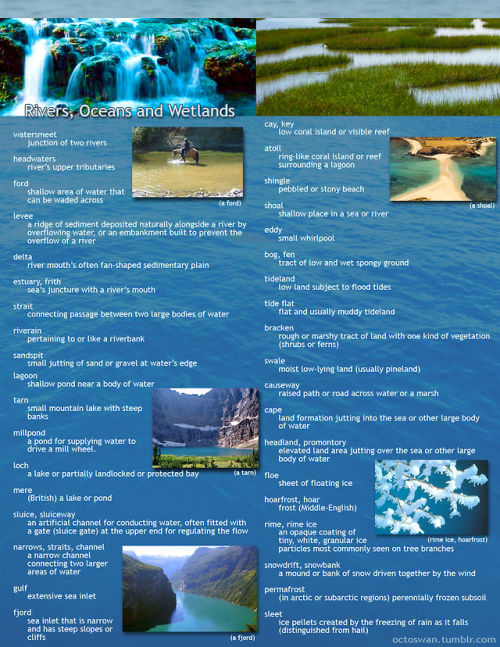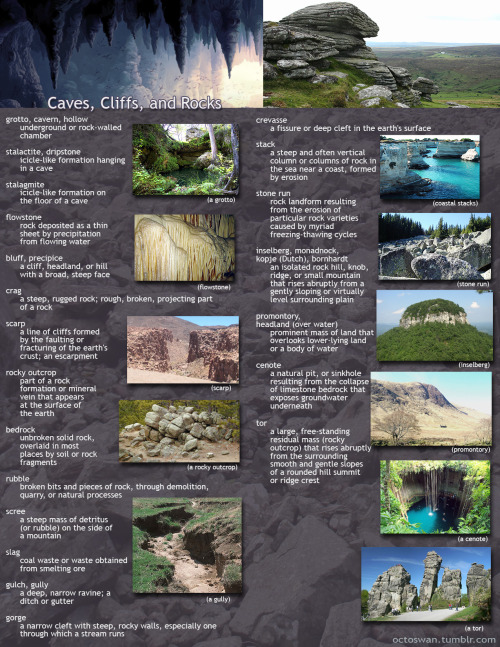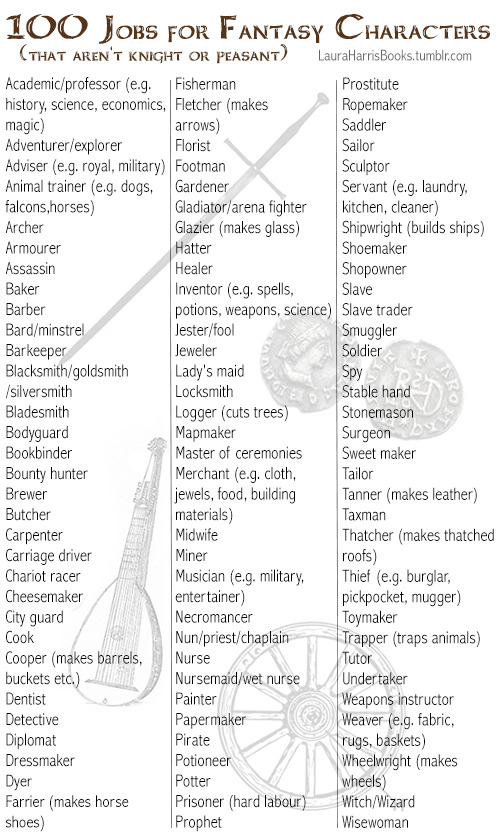Tips And Advice For Aspiring Writers, Authors, And Poets
Tips and Advice For Aspiring Writers, Authors, and Poets
Inspiration
Take inspiration from your surroundings.
Don’t ignore the ordinary. The mundane can turn into something amazing if you shift your perspective.
Save all of your ideas. Store them on post it notes in a shoe box under your bed if you please, but save them.
Be Open-Minded
Experiment with all aspects of writing. It’s art, after all.
Don’t get stuck in the planning process. That’s the most common spot writers crash and burn on the journey to writing something meaningful.
Be open to changing the story you’re writing, or ditching it altogether in search of something better.
Learn
Get real experience. Try freelance writing gigs if you’re into that sort of thing.
Collaborate with other writers.
Learn from successful writers. Read other people’s work and nitpick it to find the do’s and don’ts.
Be Realistic
Don’t write to be famous or to earn money (unless writing is your job, but in that case, I assume, it isn’t your first time doing this).
Practice writing, even when you’re not in a write-y mood.
Remember that writing is hard work, and that sometimes, it’s going to be difficult as hell to sit down and force yourself to work, but that’s part of the gig.
Chill Out
Try to enjoy it. Writing is fun, even if it’s your job
Don’t be discouraged by writer’s block. It happens to everyone, and it goes away eventually. You just have to try to work through it.
Reach out for help and advice when you need it. There are lots of people out there who want to help you.
More Posts from Inspireme-to-write and Others
IF YOU LOVE WRITING BUT DON’T HAVE THE INSPIRATION FOR A 10-PART BOOK SAGA YOU SHOULD TAKE A LOOK AT THIS SITE
IT’S INCREDIBLY HELPFUL AND CAN FOR INSTANCE GENERATE TOPICS AND FIRST LINES, CONTAINS LOADS OF EXERCISES AND YOU CAN FIND PLENTY OF WRITING TIPS.





I made these as a way to compile all the geographical vocabulary that I thought was useful and interesting for writers. Some descriptors share categories, and some are simplified, but for the most part everything is in its proper place. Not all the words are as useable as others, and some might take tricky wording to pull off, but I hope these prove useful to all you writers out there!
(save the images to zoom in on the pics)
Writing Prompt #498: Write This Story
Everything was carved out of marble. From the columns that held up the ceiling to the glistening floors. Even the tables that lined the halls were all swirling shades of white and blue.
Possibly unpopular opinion here, but I cannot stand the use of “realistic” casual dialogue. Ums and uhs and wells and yeahs and… random bouts of trailing off in the middle of sentences.
You don’t want to write realistic dialogue. You want to write dialogue equivalent to your brain’s understanding of realistic dialogue.
The broken, casual phrasing might be natural, word for word. It might even sound natural to the person who’s writing it. But it doesn’t align with the way we comprehend speech. It doesn’t account for the work our subconscious does in order to dissect and analyze speech patterns, to take in a stream of disjointed words and create a concrete meaning.
In real life, we have the privilege of being entirely engulfed in the conversation, of experiencing every visual and vocal cue, and quite often of knowing the particular tendencies of the person we’re speaking with. The reader never has this. They are constantly limited to only what is stated on the page, brought to them at exactly the speed they read it.
In real life, we also have the redundancy of being a part of boring, anti-climatic conversations. Real conversations generally go nowhere. They’re fun for the people in them, but useless to everyone else. This isn’t what you want in you writing. You want dialogue that says something, with every sentence, every phrase, every line.
Casual speech and inter-dialogue pacing (aka, the ‘…’ syndrome) has it’s place, but it’s place it not to show normalcy, but to emphasis difference. ‘Um, well… yeah’ is a stagnate, worthless line when used many times in the same story, but when used only a few times, in a book where the rest of the dialogue says what it means, it becomes an obvious sign of embarrassment and hesitation, even fear.
So write the sort of solid, easily comprehended dialogue that allows your readers to subconsciously apply pacing, without visual cues like ‘…’ or the unless addition of yeah and well, or any other removable words or phrases.
Don’t write the exact words said. Write the meaning behind them.
Disclaimer below the cut:
Keep reading
Rare Tropes
One of my favorite rare tropes is this, kitchen absolutely RECKED, but the most perfect food ever made. It's never used but I find it cute and funny. Here's an example;
Character A walks out the kitchen, covered in stains and spills, the stench of smoke wafting of them. Character B is terrified as a sloppy slice cake is placed In front them. They steal a quick glance at A, who's looking at them with an excited smile. B gives a defeated sigh, and takes sizeable bite of the cake, expecting the worst. It tastes better than heaven.
Some words to use when writing things:
winking
clenching
pulsing
fluttering
contracting
twitching
sucking
quivering
pulsating
throbbing
beating
thumping
thudding
pounding
humming
palpitate
vibrate
grinding
crushing
hammering
lashing
knocking
driving
thrusting
pushing
force
injecting
filling
dilate
stretching
lingering
expanding
bouncing
reaming
elongate
enlarge
unfolding
yielding
sternly
firmly
tightly
harshly
thoroughly
consistently
precision
accuracy
carefully
demanding
strictly
restriction
meticulously
scrupulously
rigorously
rim
edge
lip
circle
band
encircling
enclosing
surrounding
piercing
curl
lock
twist
coil
spiral
whorl
dip
wet
soak
madly
wildly
noisily
rowdily
rambunctiously
decadent
degenerate
immoral
indulgent
accept
take
invite
nook
indentation
niche
depression
indent
depress
delay
tossing
writhing
flailing
squirming
rolling
wriggling
wiggling
thrashing
struggling
grappling
striving
straining

Beyond this, consider how these professions might vary depending on who the customers are - nobles, or lower class. Are they good at their job or just scraping by? Do they work with lots of other people or on their own? City or village?
For younger characters:
Apprentice to any of the above
Messenger/runner
Page/squire
Pickpocket
Shop assistant
Student
Looks after younger siblings
(Images all from Wikimedia Commons)
jean <3
Writing Prompt #297: Hook, Line and Sinker
It only took fifty two seconds for sixteen people to disappear into thin air.
Tips On How to Write Characters with Wings (For both fanfic writers and original content writers)

So I’ve been reading a lot of fics lately where people are either
A) Putting wings onto canon characters
B) Making OCs with wings
So I decided that, with the influx of people who are writing winged characters (and therefore the influx of errors that come with writing winged characters), I’d make a little thing to help you slap a pair of wings onto anyone!
This is also a bit personal, too, because the MC in my upcoming novel has wings!
1. Know that there are a lot of types of wings to choose from

Part of being a writer is the desire to take something (whether it be a pre-existing work or an idea in your head) and make it into your own. So, instead of just going with the classic bird wings, why not spice it up a bit? If your character is an angel, you certainly don’t have to stick to the classic depictions of angel wings. Why not give them butterfly wings or dragonfly wings?
Here’s a small list of different types of wings to choose from:
Bat wings
Beetle wings
Bird wings
Butterfly/Moth wings
Dragonfly wings
Note that these wings are for animals who can fly. There are also animals who can “fly” that actually glide, such as sugar gliders and flying squirrels.
Yeah, so the options are pretty limited, but feel free to make up your own kinds of wings that aren’t necessarily based on a pre-existing creature’s wings!
2. Be familiar with the anatomy of your character’s wings and their limits

If your wings are completely unique, draw them out. A diagram or picture is key when it comes to things like description. I’m not gonna tell you what everything does and give you Animal Wing Anatomy 101, that’s for you to research. Know that there are different types of wings and that they have different uses, strengths, and weaknesses.
3. Never use the full extent of your research!

Surprise, surprise!
“But wait, Maddy!” you cry, writing utensil in hand and poised to stab me. “I thought we were supposed to were supposed to show our research!”
Well, you are. Technically that’s not wrong. But, readers don’t want to know ALL of it. Over-described wings are sometimes worse than under-described wings; what sucks more than not knowing what a character’s wings look like is having to look up wing anatomy in the middle of the chapter!
Only use the most basic of vocabulary when it comes to describing the parts of the wing. Most of the time, you just have to say “bat wing” or “feathery wing” and the readers get the basic idea. (Like seriously, do you think the readers know what a dactylopatagium brevis is????? It’s a part of skin on a bat’s wing btw)
4. Don’t bring your character’s wings up only when they’re needed!!!!

Unless your character’s wings can fade away when they’re not needed, wings are a 100% real, 24/7 thing! It’s bothersome when writers mention the wings in one chapter and then only bring them up when there’s a daring escape that needs to be performed! Most of the time, I forget that the characters even have wings at all!
There is also the fact that wings aren’t all pros and no cons. If they’re functional, they’re probably big, and if they’re muscular, they’re probably bulky. If your character is clumsy, they’ll probably knock things over constantly, and if they’re not clumsy, they’ll still knock things over constantly.
Your wings are two (or four, or five, or six quintillion) extra appendages; they’re a part of your character! You don’t have to spend every second reminding the readers that they’re there, but don’t go long stretches of time without even mentioning them.
5. Your character’s wings can be a good way to indicate their mood or to provide for that little bit of description that you think you make be lacking
Why wouldn’t you want to describe the wings? I mean, you don’t want to describe every minute detail over and over again, but it’ll boost your word count a lot more than you think. They can also be used to convey your character’s feelings without explicitly telling the reader! It’s like a new set of facial expressions!

See? You can tell he’s wary and ready to fight from the movement of his wings! Also he’s crouching next to a dead body but that’s not relevant right now
Here’s a list of wing language (?) that you can incorporate into your story that will not only increase your word count, but will also add to the sustenance of your story!
Nervous
Twitch
Flutter
Ripple
Fold tightly
Fidget
Flap
Angry
Flare
Bristle
Fluff up
Ripple
Beat
Raise up
Snap open
Happy
Flutter
Curl up
Ripple
Wave
Flap
During Battle
Bludgeon
Smack
Bat
Clout
Whack
Kick someone’s legs out from under them
Snap someones neck (only for muscular wings like bat and bird wings)
Problems that may come with having wings
Poke out from under blankets and let all of the cold air in
Stepped on
Get pins and needles from being folded for too long
Squashed on chairs/ in beds/ in crowded hallways
Vulnerable in battle
Molting (for bird wings)
Hope this helped!!!
-
 buttons-on-shirts liked this · 9 months ago
buttons-on-shirts liked this · 9 months ago -
 sunshineshadowcast reblogged this · 10 months ago
sunshineshadowcast reblogged this · 10 months ago -
 sunshineshadowcast liked this · 10 months ago
sunshineshadowcast liked this · 10 months ago -
 internal-bleating reblogged this · 1 year ago
internal-bleating reblogged this · 1 year ago -
 internal-bleating liked this · 1 year ago
internal-bleating liked this · 1 year ago -
 write-101 reblogged this · 1 year ago
write-101 reblogged this · 1 year ago -
 intolerable-sushi liked this · 1 year ago
intolerable-sushi liked this · 1 year ago -
 the-aspiring-fanfic-writer liked this · 1 year ago
the-aspiring-fanfic-writer liked this · 1 year ago -
 heckcareoxytwit liked this · 2 years ago
heckcareoxytwit liked this · 2 years ago -
 loudwhispersdaze liked this · 2 years ago
loudwhispersdaze liked this · 2 years ago -
 midnight-raconteuse reblogged this · 2 years ago
midnight-raconteuse reblogged this · 2 years ago -
 writer-of-passion reblogged this · 2 years ago
writer-of-passion reblogged this · 2 years ago -
 garry34 liked this · 2 years ago
garry34 liked this · 2 years ago -
 teahyuck liked this · 2 years ago
teahyuck liked this · 2 years ago -
 yesireblogstuff reblogged this · 3 years ago
yesireblogstuff reblogged this · 3 years ago -
 saving-the-drafts-king reblogged this · 3 years ago
saving-the-drafts-king reblogged this · 3 years ago -
 eviletters reblogged this · 3 years ago
eviletters reblogged this · 3 years ago -
 azul89 liked this · 3 years ago
azul89 liked this · 3 years ago -
 queerhistorymajor liked this · 3 years ago
queerhistorymajor liked this · 3 years ago -
 retaaschilling liked this · 3 years ago
retaaschilling liked this · 3 years ago -
 moonboohoo liked this · 3 years ago
moonboohoo liked this · 3 years ago -
 angelsflyviolet liked this · 3 years ago
angelsflyviolet liked this · 3 years ago -
 asuko0117 liked this · 4 years ago
asuko0117 liked this · 4 years ago -
 creamyslatte liked this · 4 years ago
creamyslatte liked this · 4 years ago -
 casualdandanie liked this · 4 years ago
casualdandanie liked this · 4 years ago -
 the-heart-of-my-mystery reblogged this · 4 years ago
the-heart-of-my-mystery reblogged this · 4 years ago -
 ignalina-c0re reblogged this · 4 years ago
ignalina-c0re reblogged this · 4 years ago -
 felice-jaganshi reblogged this · 4 years ago
felice-jaganshi reblogged this · 4 years ago -
 callmestannismaybe liked this · 4 years ago
callmestannismaybe liked this · 4 years ago -
 felice-jaganshi liked this · 4 years ago
felice-jaganshi liked this · 4 years ago -
 lord-of-the-sass liked this · 4 years ago
lord-of-the-sass liked this · 4 years ago -
 the-outsider-and-other reblogged this · 4 years ago
the-outsider-and-other reblogged this · 4 years ago -
 the-outsider-and-other liked this · 4 years ago
the-outsider-and-other liked this · 4 years ago -
 acevav reblogged this · 4 years ago
acevav reblogged this · 4 years ago -
 acevav liked this · 4 years ago
acevav liked this · 4 years ago -
 anki-of-beleriand reblogged this · 4 years ago
anki-of-beleriand reblogged this · 4 years ago -
 anki-of-beleriand liked this · 4 years ago
anki-of-beleriand liked this · 4 years ago